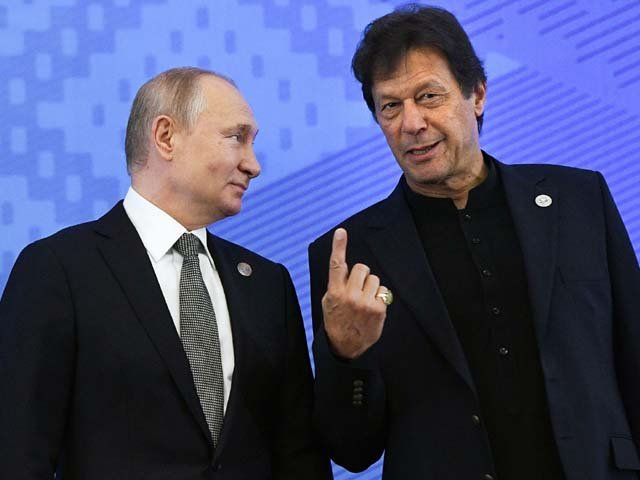The Russian Navy’s Black Sea Fleet announced on Thursday that it plans to participate in next year’s multinational AMAN-2021 naval drills to be hosted by Pakistan. These biennial exercises aim to improve joint coordination in maritime rescue missions and combating piracy, among other issues of common concern. It’s extremely symbolic that Russia agreed to participate since its fleet said that it’ll be the first time since the “Bold Monarch-2011” exercises off of the Spanish coast that its naval forces will join NATO’s. Other than Pakistan, Russia, and the US, nearly 30 other countries’ navies will take part in next year’s drills too.
Moscow is sending several important signals by agreeing to participate, the most obvious of which is that relations with Islamabad are rapidly improving to the point where it feels comfortable attending its exercises alongside NATO forces. This speaks to Russia’s changing perceptions of Pakistan from a partisan Old Cold War-era player to a neutral “balancing” force in global affairs. It also represents an important milestone in their on-going rapprochement, which was initially driven by shared anti-terrorist concerns stemming from ISIS’ arrival in Afghanistan but has since evolved to a comprehensive partnership with long-term strategic intentions.
Extrapolating from this observation, my insight from almost two years ago that Pakistan is the global pivot state seems to now be tacitly shared by the Russian leadership. The South Asian country’s hosting of the BRI’s flagship project of CPEC enables it to function as the Zipper of Eurasia, after which it could serve as the Convergence of Civilisations across the Eastern Hemisphere through my related CPEC+ proposals for more closely integrating Afro-Asia via northern (N-CPEC+), western (W-CPEC+), and southern (S-CPEC+) branch corridors. Russia naturally appreciates Pakistan’s growing global geostrategic significance and doesn’t want to be left out.
Moscow’s “military diplomacy” – which is the use of military means to advance political goals – explains its participation in next year’s naval exercises. Russian political observer Dmitry Bokarev, in his latest article for Journal NEO (which is the official journal of the Russian Academy of Sciences’ Institute of Oriental Studies), quoted Russian Ambassador to Pakistan Danila Ganich’s speech at the opening of this year’s Druzhba (“Friendship”) joint anti-terrorist drills where he praised the Pakistan Army as “the core of Pakistani statehood and society.” This suggests that the Russian-Pakistani rapprochement is being driven by “military diplomacy”.
With that in mind, the larger geopolitical context of their rapprochement needs to be discussed. As I asked in September, “Is Russia ‘Abandoning’ Or ‘Recalibrating’ Its ‘Balancing’ Act Between China & India?”, which raised questions about the inadvertent impact that the “The Indian-Russian Relations Renaissance” might have on Russian-Chinese relations. Following the unexpected publication of influential BJP official Subramanian Swamy’s hateful anti-Russian article in November, I then warned that “Extreme Pro-US BJP Ideologues Mustn’t Be Allowed To Sabotage Russian-Indian Relations”.
In the aftermath of that political scandal which enormously damaged the goodwill and trust which previously characterised the Russian-Indian Strategic Partnership (especially over the past year since they began their “renaissance”), it makes sense that Russia would seek to recalibrate its “balancing” act even further by more openly embracing Pakistan. This is exactly what I encouraged Russia to do in the academic article that I jointly co-authored over the summer about “Pakistan’s Role In Russia’s Greater Eurasian Partnership”, which was republished by the Russian International Affairs Council (RIAC), one of the country’s top think tanks.
Proof of that policy being practiced in the current context can be seen by the fact that Russia and Pakistan finally reached an agreement on their long-discussed pipeline plans two weeks after the Swamy scandal. Discussions clearly predated that scandal by many years, but it’s symbolic that the timing happened to coincide with the diplomatic aftermath of that incident. It’s also more than curious that Russia is now more confidently practicing its “military diplomacy” with Pakistan by agreeing to join next year’s AMAN-2021 drills, during which time it’ll participate alongside some of its NATO rivals.
Interestingly, it had hitherto been India which professed to practice a policy of so-called “multi-alignment”, yet instead of that South Asian state being the scene where the Russian and NATO navies will participate in multilateral exercises, it ends up being the global pivot state of Pakistan. At the risk of reading too much between the lines and “speculating”, it certainly seems to be the case that Russia is nowadays more sure of Pakistan’s actual geostrategic neutrality than India’s unconvincing claim to the same, especially since Russian Foreign Minister Lavrov sharply criticised the influence of India’s American ally over New Delhi recently.
All things considered, next year’s AMAN-2021 will be a milestone in Russian-Pakistani relations, and it wouldn’t have been possible had it not been for Moscow’s political maturity in turning the page on its complicated history of relations with Islamabad and courageously deciding to chart a new chapter of cooperation together in the emerging Multipolar World Order. From the Russian perspective, the improvement of relations with Pakistan allows Moscow to perfect its sensitive “balancing” act in Eurasia – especially between newfound rivals China and India – whereas relations with Russia allow Islamabad to reaffirm its geostrategic neutrality.
Both countries have increasingly come to realise that they need one another. President Vladimir Putin’s vision of a Greater Eurasian Partnership is incomplete without Pakistan’s participation – the same as it’s impossible to synergise the Eurasian Union with the BRI like he earlier proposed without a rapprochement in relations considering that Pakistan hosts the BRI’s flagship project of CPEC – just like Pakistan’s CPEC+ vision of becoming the global pivot state can’t happen without N-CPEC+ connecting it to Russia. Since both of their militaries influence foreign policy, it makes sense why “military diplomacy” is driving their rapprochement, hence AMAN-2021.




